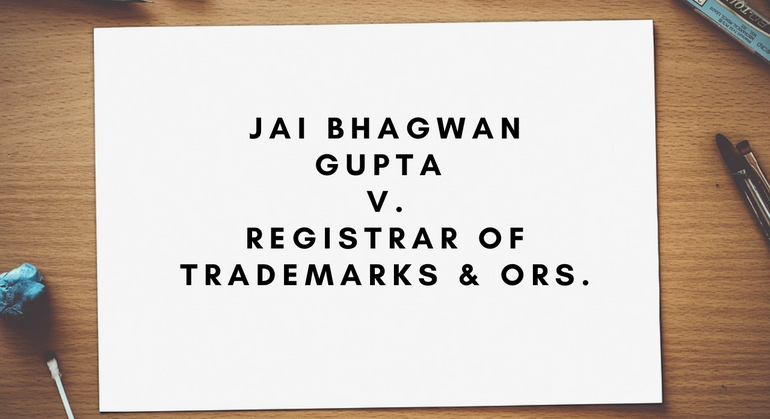

Jai Bhagwan Gupta v. Registrar of Trademarks & Ors.
In the instant case, Mr. Jai Bhagwan Gupta (Petitioner), proprietor of M/s. Bhagwan Kirana Company had registered its trademark for the “JEERA PUJARI” (word mark) and “JAI PUJARI BRAND” (label mark) which have been duly renewed by the Petitioner.
However, despite the registered trademarks, the Registrar of Trademarks ( Respondent) is advertising other trademarks which include the word “PUJARI” and fall under the category of identical goods in Class 30. Thereafter, the Petitioner had filed an opposition in the Registry with regard to these marks issued but the same had become a burden upon him with regard to the cost of opposition filed and in keeping an eye on the trademark journal.
In light of the aforesaid, the Petitioner filed this writ petition against the Respondents and has asked for the relief as follows:
- issue a writ of certiorari quashing the impugned publication of the trademarks of respondent no. 4 and 5 published in the trademark journals being ANNEXURES P – 4 & 5 as illegal and unconstitutional and proceedings have taken towards its registration;
- issue a writ of mandamus directing respondents no. 1 and 2 to perform the-official functions in consonance with provisions of law and principles of natural justice and further to desist from publishing trademarks identical with or deceptively similar to petitioner’s trademarks in trademark journals without following due procedures and provisions of law as envisaged under the Trade Marks Act and Rules thereunder.”
Issues
In the present case, the issue was whether the acceptance of trademark or advertisement before acceptance can be granted to trademarks which are similar to the already registered trademarks?
Judgment
The Court examined the submissions and observed that whenever a trademark is filed, the Registrar of Trademarks has an obligation to scrutinize the application according to Section 9 and Section 11 of the Act which comprises Relative grounds and Absolute grounds for refusal of registration of trademark respectively. The Registry has to examine all the applications according to the provisions of the Trademark Act, 1999.
Accordingly, after examining the application for the trademark, the Registry can either accept the trademark and advertise the same in the trademark journal or may without accepting the trademark, advertise it before acknowledging its acceptance according to the provision of Section 20(1) of the Act.
The Court further observed that the Respondent has been following the practice of passing a specific order regarding either accepting the trademark or permitting advertisement of a trademark before acceptance in cases where there exists a doubt with respect to whether a particular trademark should be accepted or not. The practice was followed with the view which was briefly marked in Narayanan on Trade Marks and Passing Off, [Narayanan, P. (2004). Law of Trade Marks and Passing Off (6th ed.). Kolkata: Eastern Law House] and also the Court expressed that similar thoughts were cited in Halsbury’s Laws of India, Vol. 20(1).
Thus, the Court held that the action has to be performed in exceptional circumstances and not every trademark is advertised before acceptance. Although it has been noticed that in recent times, a number of trademarks are advertised before acceptance under the Proviso of Section 20 (1) of the Act. Such practice is contrary to the law of the land. Therefore, the Court held that: “Under Section 20(1), there has to be a reason why the Registrar of Trademarks is directing `advertisement before acceptance’ and the same cannot be a ministerial act or a mere formality.”
The Registrar should apply all the provisions along with a deliberate and conscious application of mind before granting the advertisement to trademark prior to its acceptance and held that: “Thus, as per court, it is not proper and is impermissible for the Registrar of Trademarks to direct advertisement of a majority of marks, before acceptance, under the proviso to Section 20(1) of the Act. A specific order would have to be passed as to the reason why the mark is being advertised after acceptance or the reason why the mark is being advertised before acceptance. The order need not be detailed but ought to exist on file, even if, very brief.”
Therefore, the Court ordered that the Respondent shall make sure that whenever marks proceed for advertisement, a specific brief order is passed under Section 20(1) after acceptance for advertisement or under exceptional circumstances, in view of the proviso to Section 20(1) for advertisement before acceptance. All marks ought not to be allowed to proceed for advertisement and thereafter for registration.
The Court thus disposed of this petition and held that: “The opposition, which is pending in respect of trademark registration no. 1285292, shall now be decided expeditiously. Whenever any applications are filed and consist of the word “PUJARI” especially in respect of Class 30, the Registrar of Trademarks shall bear in mind the registrations of the Petitioner and shall direct advertisement under Section 20 only after considering the said trademark registrations of the Petitioner under either Section 20(1) or under the Proviso to Section 20(1). In case the mark is advertised, the Petitioner’s right to oppose the mark would still be available and such oppositions shall be decided in accordance with the law. With these observations, the writ petition and all pending applications are disposed of. “



